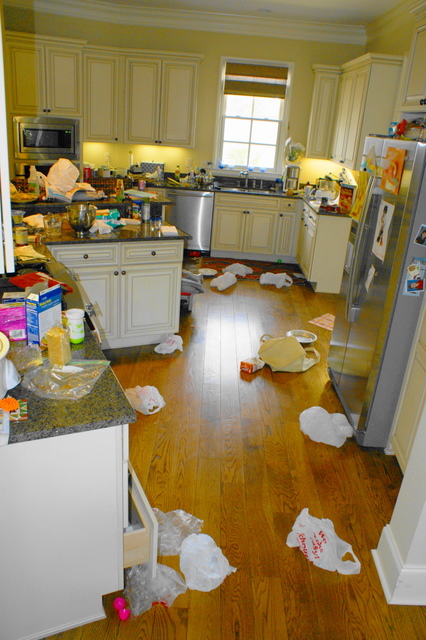looking low and high
in light of yesterday’s post about the state of my kitchen,

i thought i’d string a few words together about housekeeping.
my parents, sibling, college roommate, husband, children, and friends know that i was simply born without the part of the brain that exhibits concern over the disorder of physical space and provides impetus to clean with tornadic vigor. this is unfortunate for reasons depicted above. i would argue, though, that this weakness is turning out to be a gift now that i am a parent, who is regularly called to tolerate not only my own personal chaos but that of the three other males (and four, if you count the dog), who live in my house.
but some messes, like the one in my kitchen yesterday, are magnaimous enough to defeat even my inner slob. and on those rare occasions, i have no choice but to put on some loud music, go against my very nature, and CLEAN. thanks to these words in barbara brown taylor’s an altar in the world, i am beginning to see that there is a special sort of dignity to be found in scraping smushed strawberries off the floor with my fingernail:
“i no longer call such tasks housework. i call them the domestic arts, paying attention to all the ways they return me to my senses. when the refrigerator has nothing in it but green onions that have turned to slime and plastic containers full of historic leftovers, i know my art is languishing. when i cannot tell whether that is a sleeping cat or an engorged dust ball under my bed, i know that i have been spending too much time thinking. it is time to get down on my knees. after i have spent a whole morning ironing shirts, folding linens, rubbing orange-scented wax into wood, and cleaning dead bugs out of the light fixtures, i can hear the whole house purring for the rest of the afternoon. i can often hear myself singing as well, satisfied with such simple, domestic purpose.
…this is my practice, not yours, so please feel free to continue calling such work utter drudgery. the point is to find something that feeds your sense of purpose, and to be willing to look low for that purpose as well as high. it may be chopping wood and it may be running a corporation. whatever it is, perhaps you will hold open the possibility that doing it is one way to learn what it means to become more fully human, as you press beyond being good to being good for something, in a world with the perfect job for someone like you” (120).
now let’s be honest. i’m not much into ironing, and the bugs in my light fixtures are there to stay. but after yesterday’s (eventual) kitchen cleanup, i could almost hear our house purring. i’ve been trained to look for meaning in sacred texts, good conversation, masters degree programs, and travels to far lands. but there is a lot of truth to be found when i’m on my knees, bringing order out of chaos within the four walls of our fabulously messy house.
[the source for this post can be found on the bibliography page located on the sidebar to your right.]
Tags: altar in the world, barbara brown taylor, chaos, cleaning, domestic arts, kitchen, meaning, messy











April 3rd, 2010 at 6:37 pm
No after shot?
That’s always the picture I can’t wait to share. Thanks for sharing the real picture with us!
April 6th, 2010 at 11:19 am
Kathleen Norris’ “The Quotidian Mysteries: Laundry, Liturgy and ‘Women’s Work'” is my grounding for housework, breastfeeding (when I was) & all other things that feel meaningless. It’s short & sweet if you haven’t picked it up before
“Is it not a good joke that when God gave us work to do as punishment for our disobedience in Eden, it was work that can never be finished, but only repeated, day in and day out, season upon season, year after year? I see here not only God’s keen sense of humor, but also a creative and zestful love. It is precisely these thankless, boring, repetitive tasks that are hardest for the workaholic or utilitarian mind to appreciate, and God knows that being rendered temporarily mindless as we toil is what allows us to approach the temple of holy leisure …
“Both liturgy and what is euphemistically termed “domestic” work also have an intense relation with the present moment, a kind of faith in the present that fosters hope and makes life seem possible in the day-to-day.”
pp. 26-27, 35